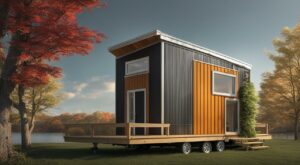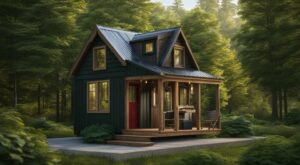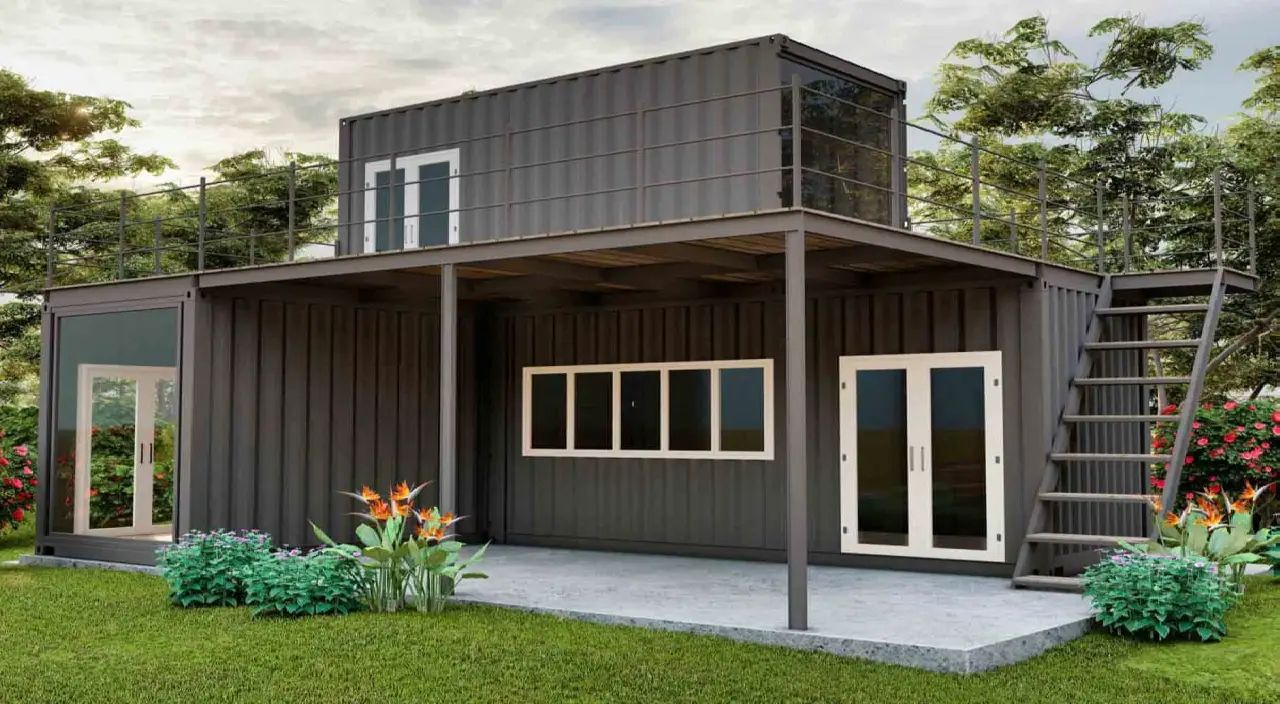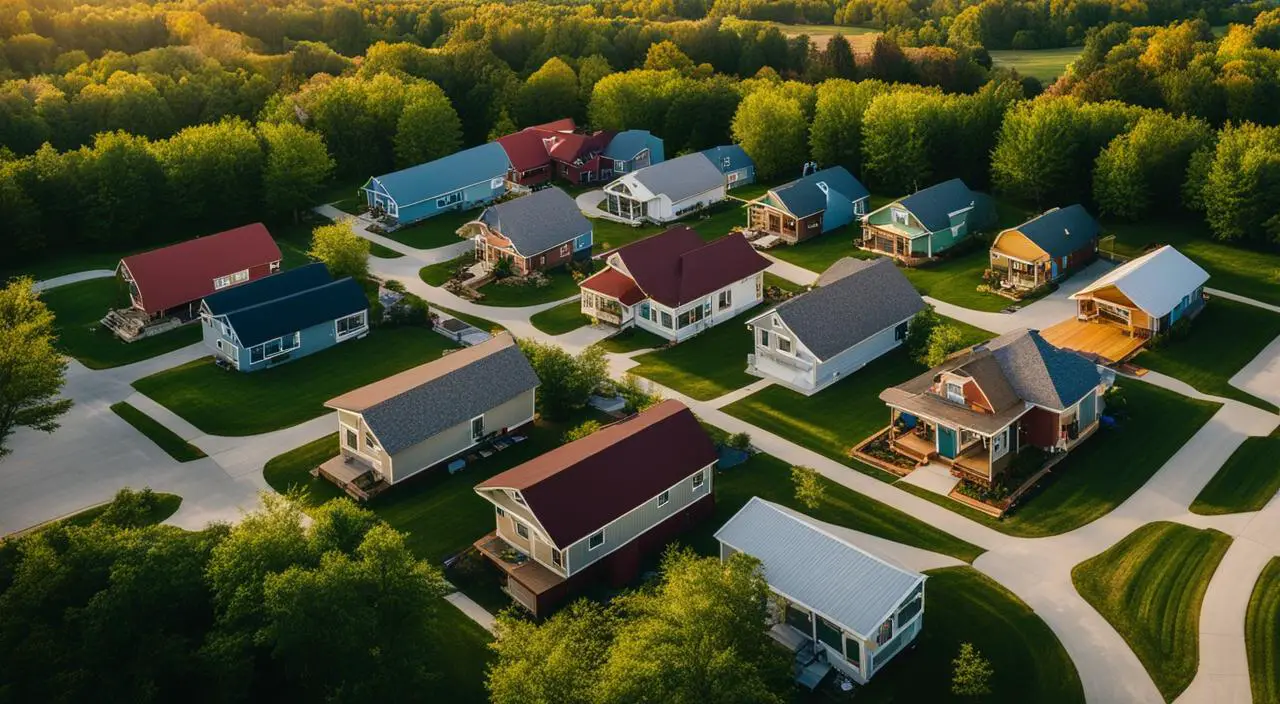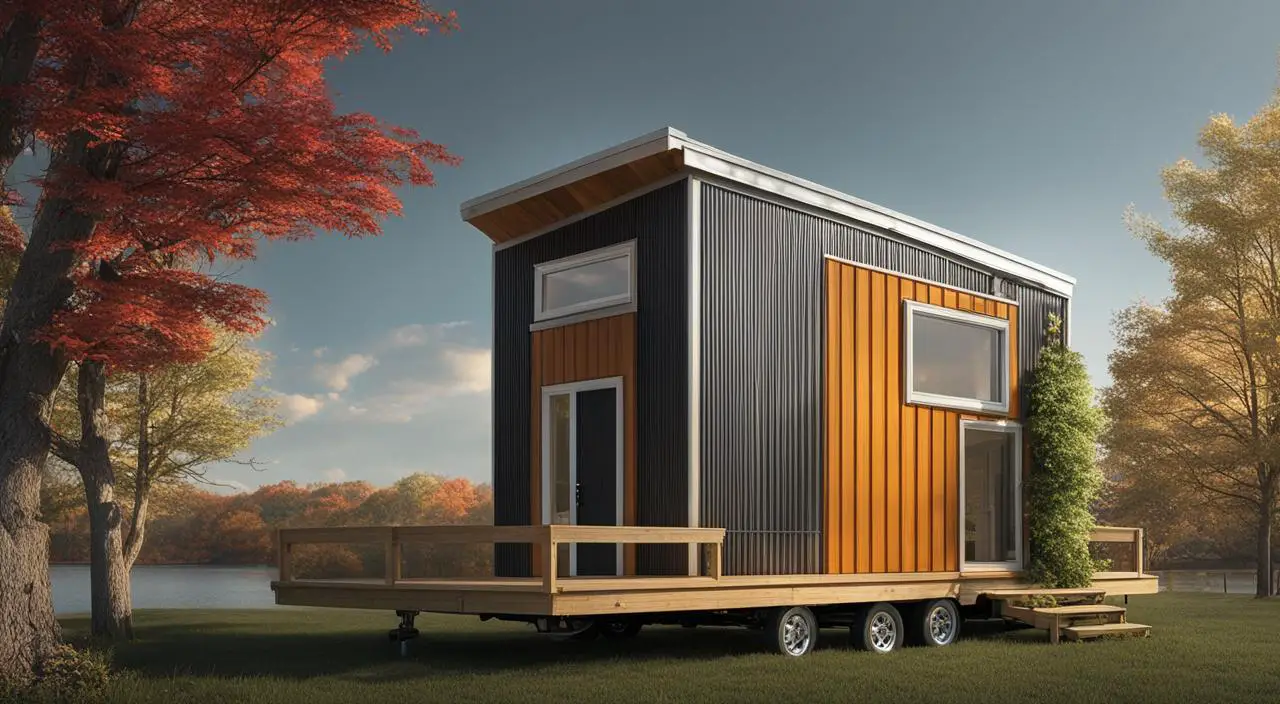Your cart is currently empty!
Understanding Tiny House Laws in Virginia: A Quick Guide
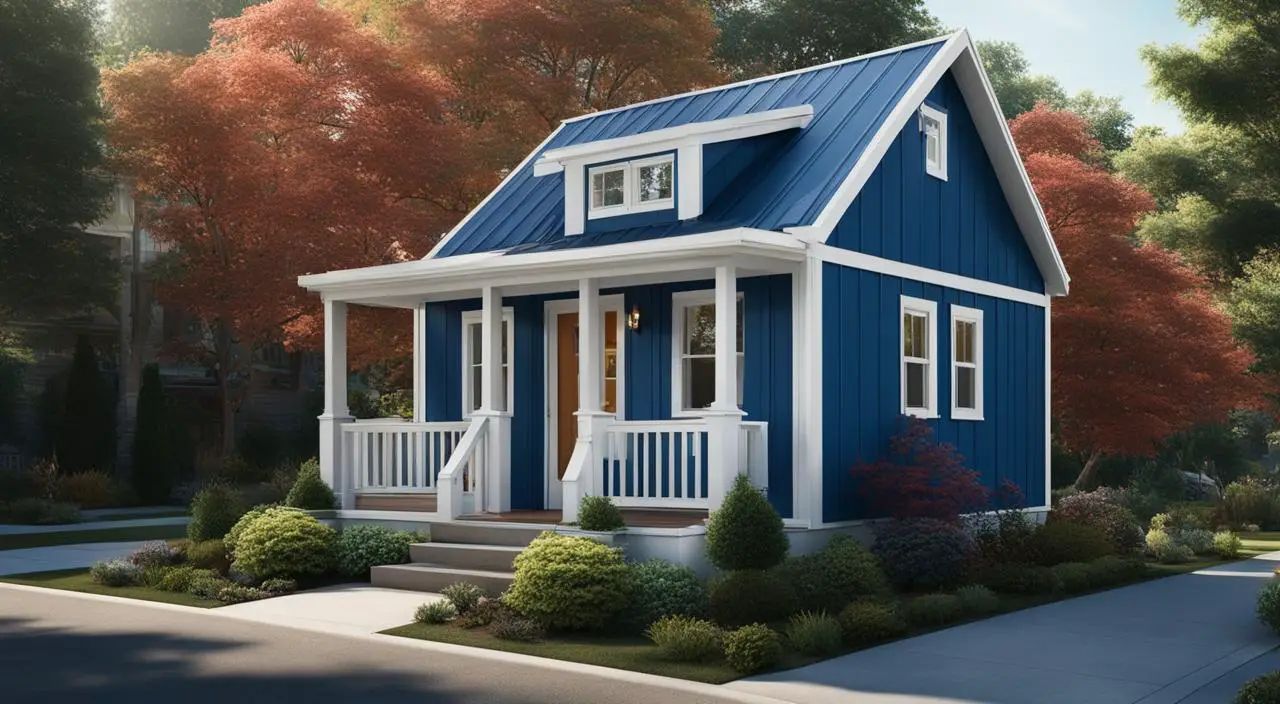
Affiliate Disclaimer: This post may contain affiliate link or links
Are you interested in living in a tiny house in Virginia? If so, it’s important to understand the state’s regulations and requirements for these unique dwellings.
Contents
While tiny homes offer a cost-effective and eco-friendly alternative to traditional housing, they must comply with specific laws to be considered legal.
In this quick guide, we’ll explore Virginia’s tiny house laws and everything you need to know before making the move to a tiny home.
Virginia Residential Code and Zoning Regulations
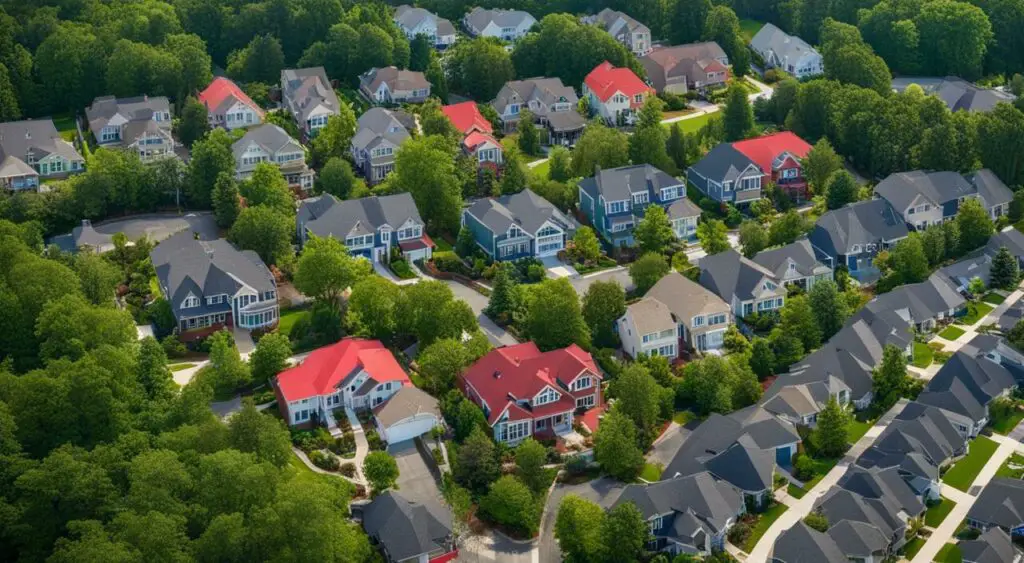
Tiny house enthusiasts looking to settle down in Virginia need to understand the state’s residential code and zoning regulations.
These regulations govern the construction, placement, and occupancy of all dwellings, including tiny houses. Failure to comply with these legal requirements can result in hefty fines and even eviction.
The Virginia Residential Code sets the minimum standards for building homes in the state. It covers construction materials, fire safety, plumbing and electrical systems, and more.
Tiny houses must adhere to these standards to ensure safe and habitable living conditions. Zoning regulations, on the other hand, dictate where a tiny house can be placed.
The state and local authorities have their own zoning laws for various types of housing, and tiny homes are no exception.
These laws set the rules for the location of tiny houses, including requirements for property size, setbacks, and access to utilities.
Legal Requirements for Tiny Houses in Virginia
Virginia’s legal requirements for tiny houses are based on the International Residential Code (IRC), which provides guidelines for the construction of small homes.
According to the IRC, a tiny house must meet the following criteria:
- It must be no larger than 400 square feet
- It must be built on a permanent foundation
- It must include a sleeping area, living area, kitchen, and bathroom
Additionally, tiny houses on wheels are considered recreational vehicles (RVs) and are subject to different regulations than permanent homes.
However, many Virginia localities have specific zoning laws for tiny houses on wheels, providing a legal framework for parking and occupying these homes.
Zoning Laws for Tiny Homes in Virginia
Each Virginia locality has its own zoning laws for tiny homes, so it’s essential to check with the local authorities before building or placing a tiny home.
In general, tiny homes are subject to the same zoning laws as other types of housing, including single-family homes and townhouses.
Zoning laws determine where a tiny home can be placed, including the property’s setback from the street and neighboring properties.
There are also regulations that govern the use of land for specific purposes, such as residential or commercial activities.
Building Codes for Tiny Houses in Virginia
In addition to the Virginia Residential Code, tiny houses in Virginia are subject to specific building codes. These codes vary depending on the type of tiny home, its location, and its intended use.
For example, tiny houses on wheels must meet the requirements of the National Fire Protection Association (NFPA) 1192 Standard for Recreational Vehicles.
Tiny homes on permanent foundations must follow the International Building Code (IBC) and the International Residential Code (IRC).
Obtaining the necessary permits and meeting these codes is crucial to ensure the safety and legality of a tiny home in Virginia.
It’s essential to consult with local authorities and hire qualified professionals to ensure compliance with these regulations.
Minimum Square Footage Requirements
Virginia has minimum square footage requirements for tiny homes, which can vary depending on the specific area and zoning regulations.
These requirements dictate the smallest square footage that a tiny house can legally be constructed with.
The aim of these regulations is to ensure that tiny homes are safe and livable spaces.
While there is no set national standard for minimum square footage in tiny homes, Virginia’s regulations require tiny homes to have a minimum of 200 square feet of livable space.
The code also specifies that tiny homes on foundations must comply with the Virginia Residential Code and that homes on wheels must adhere to ANSI/RVIA 119.2, a set of standards for recreational vehicles.
A tiny house that falls below the minimum square footage requirements in Virginia might be prohibited from being used as a permanent residence, depending on the area’s zoning regulations.
Therefore, it is essential to research the specific zoning rules and regulations of the locality where you plan to live.
It’s important to note that this minimum square footage requirement applies only to the livable space inside the tiny home. Porches, lofts, and other non-livable spaces are not included in this calculation.
Complying with the minimum square footage requirements is just one of the many requirements for building and living in a tiny home in Virginia.
Homeowners and builders should consider all legal regulations and zoning laws before planning and constructing a tiny home.
Single Family Residences and Tiny House Classification
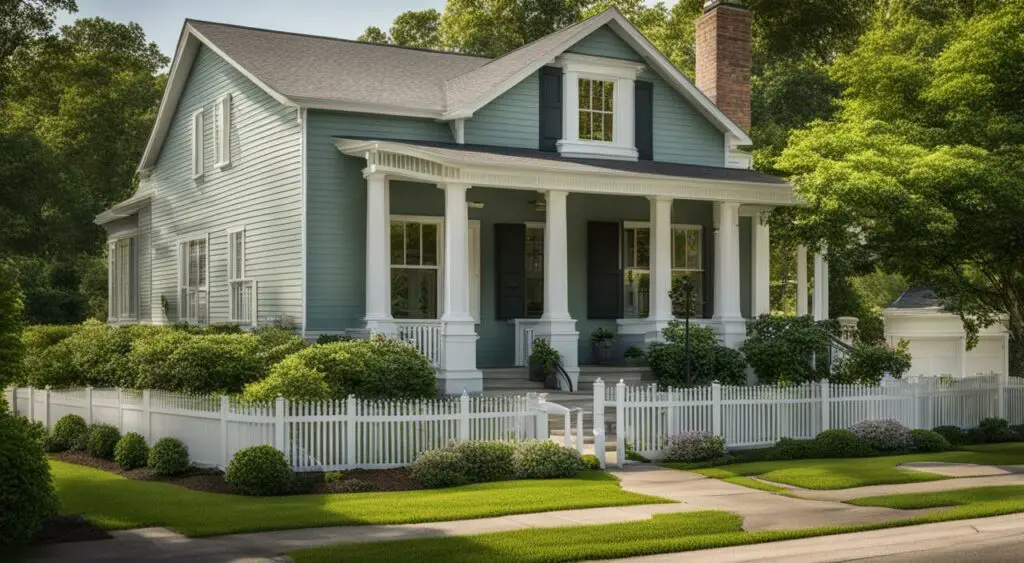
In Virginia, tiny houses are classified as single-family dwellings, which means they are subject to the same regulations and requirements as traditional homes.
According to the Virginia Residential Code, a single-family residence is defined as “a detached building that is used and occupied for residential purposes by one family.
The Code also specifies that a family can consist of “one or more persons” related by blood, marriage, or adoption, along with domestic servants.
Therefore, for tiny houses to be considered legal in Virginia, they must meet the same standards as any other single-family dwelling.
This includes complying with local zoning laws and obtaining any required permits and inspections.
It is worth noting that some localities may have their own regulations regarding single-family residences and the minimum size requirements for dwellings.
For example, Fairfax County requires single-family homes to have at least 200 square feet of floor space for the first occupant, and an additional 100 square feet for each additional occupant.
Therefore, it is important to research the specific regulations and requirements for the locality where you plan to build or park your tiny home in Virginia.
This will ensure that you are building a legal and safe residence that meets all necessary standards.
Building Codes and Permits
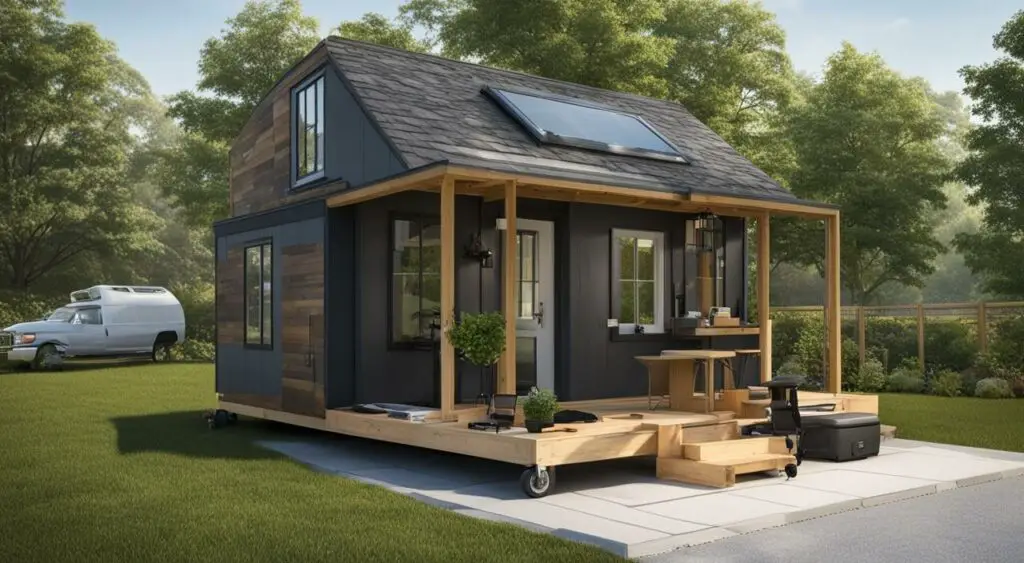
Constructing a tiny house in Virginia requires obtaining the necessary permits and complying with building codes. These requirements are in place to ensure the safety and structural integrity of the dwelling.
The permits for tiny house construction in Virginia vary based on the location of the build. In some areas, a building permit is required for any residential construction, including tiny homes.
In other areas, permits may be required for land use and occupancy. It’s essential to research and understand the specific permits needed for the location of the build.
In addition to permits, building codes must be followed during construction to ensure that the structure is safe and meets certain standards.
The building codes for tiny houses in Virginia vary based on the size and type of dwelling.
Generally, tiny homes on wheels must meet standards set by the National Fire Protection Association (NFPA) and the International Code Council (ICC) for recreational vehicles.
On the other hand, tiny homes that are built on a foundation must meet the Virginia Residential Code.
Avoiding the necessary permits and building code requirements can result in significant fines and legal consequences. It’s crucial to ensure all requirements are met before beginning the construction process.
Permit Requirements Example
| Permit Type | Cost | Additional Requirements |
|---|---|---|
| Building Permit | $150 | Building plans, site plan, land use approval |
| Occupancy Permit | $50 | Inspection of the completed structure, proof of compliance with building codes |
Tiny House Communities and Zoning Laws
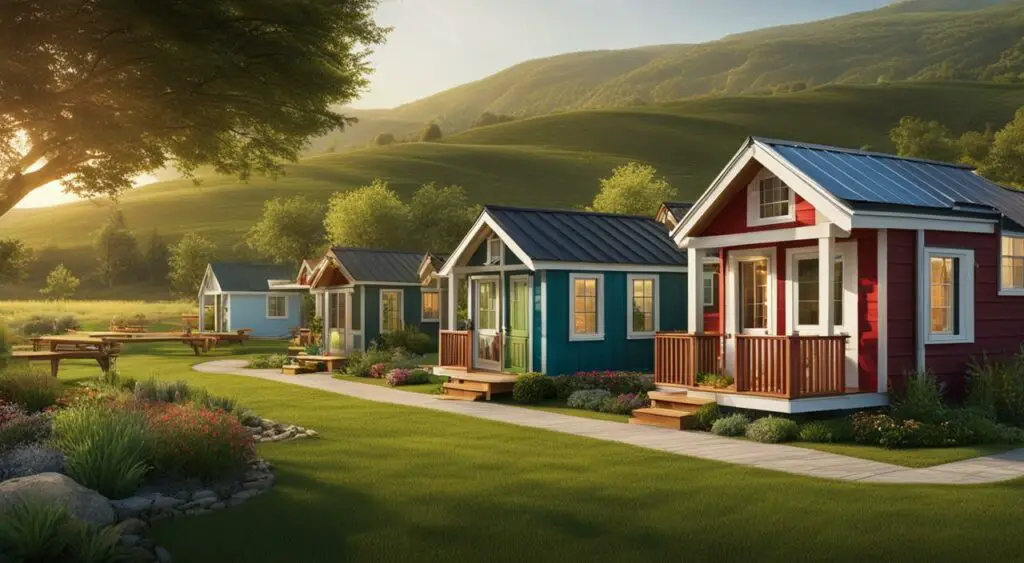
Tiny house communities have gained popularity among those interested in downsizing and living with a smaller environmental footprint.
However, zoning laws in Virginia make it difficult to establish these communities legally.
Unlike traditional single-family residences, tiny homes are often classified as “accessory dwelling units,” which can complicate zoning regulations.
In Virginia, zoning ordinances are set by individual localities and can vary significantly from one area to another.
An important consideration when establishing a tiny house community is the requirement for a permanent foundation.
According to zoning regulations, tiny homes on wheels are considered recreational vehicles and can only be parked in designated RV parks or campsites.
However, there is progress in Virginia towards the legalization of tiny homes.
In 2020, the Virginia state legislature passed a law allowing local governments to legalize accessory dwelling units, including tiny homes, as part of their comprehensive plans.
The law requires localities to adopt an ordinance for permitting these units and sets certain standards for their construction and placement.
| Regulations for Tiny House Communities in Virginia | Zoning Regulations for Tiny Homes in Virginia | Virginia Tiny House Legalization |
|---|---|---|
|
|
|
As zoning regulations and requirements for tiny house communities continue to evolve in Virginia.
It is important for those interested in establishing or residing in a tiny home community to consult with local authorities and advocacy groups to ensure compliance with regulations and procedures.
Tiny House Movement and Advocacy in Virginia
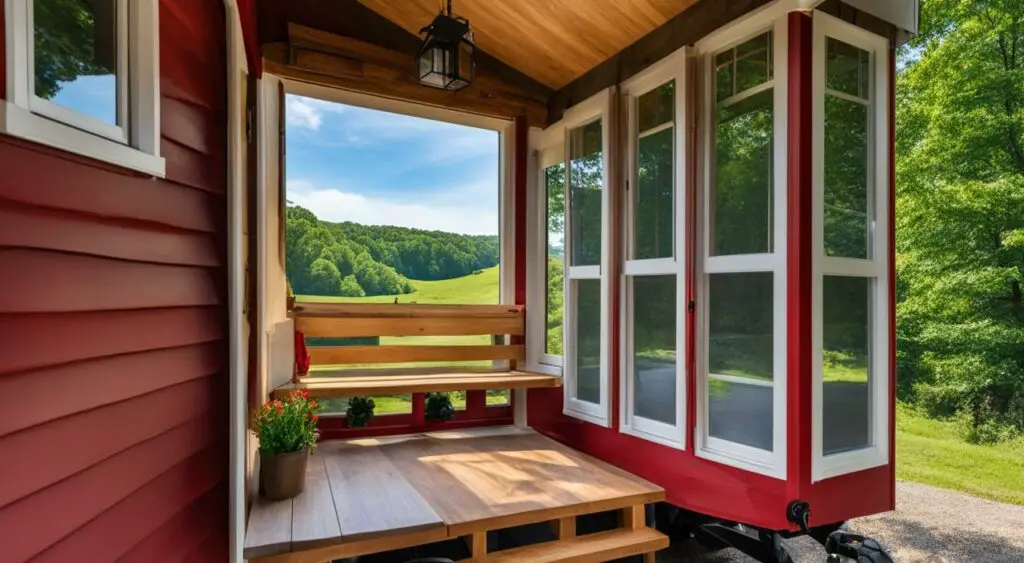
The tiny house movement has gained significant momentum across the United States and Virginia is no exception.
More and more people are exploring alternative housing options, drawn to the financial freedom, minimalism, and eco-friendliness that tiny homes offer, and advocacy groups are working to promote the legalization of tiny house living in Virginia.
The tiny house movement in Virginia is still relatively new, but it has seen increasing support in recent years.
Advocates are pushing for changes to zoning regulations and building codes to make it easier for people to live in tiny houses legally in the state.
The Tiny House Alliance Virginia is one such group.
The organization is dedicated to advocating for and advancing the tiny house movement in the state.
It offers resources, support, and information for people interested in living in a tiny home in Virginia.
The Virginia Tiny House Association is another group working to promote and legalize tiny house living in the state.
The association hosts events, workshops, and community-building activities to support the movement in Virginia.
Despite the growing interest and advocacy efforts, there are still challenges to overcome in terms of legalizing tiny houses in Virginia.
Advocates face opposition from some officials and organizations who argue that tiny homes pose safety and health risks and that they are not a viable long-term housing solution.
However, the push for tiny house legalization in Virginia continues.
Advocates believe that tiny homes offer a more sustainable, affordable, and community-driven approach to housing that can provide a solution to the state’s affordable housing crisis.
For those interested in joining the tiny house movement in Virginia, there are many resources and advocacy groups available.
It’s important to stay informed about the current regulations and guidelines for tiny house living in the state and to work with advocacy groups to push for change and legalization.
Legal Guidelines and Restrictions on Tiny Houses
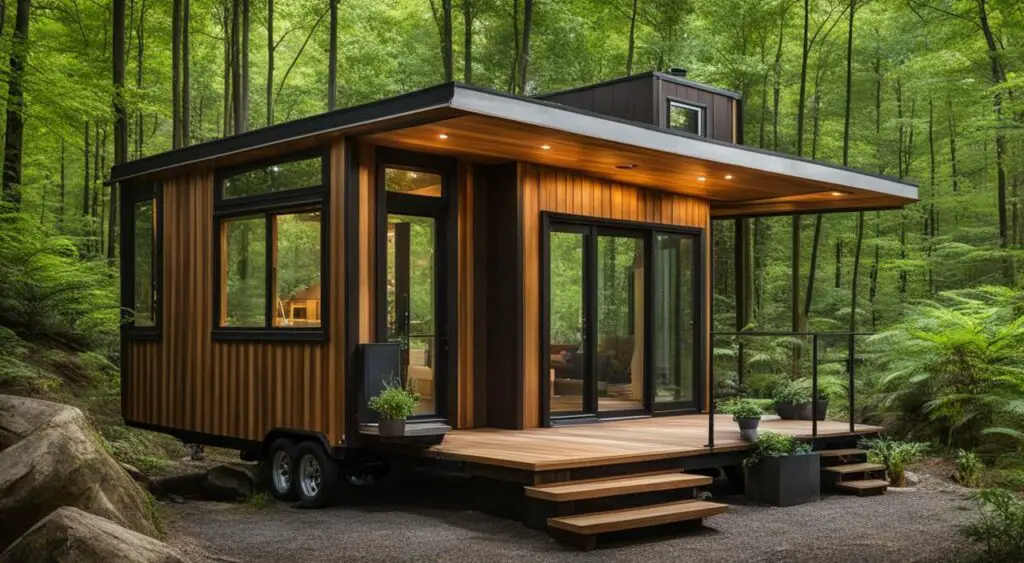
Tiny house enthusiasts in Virginia need to be aware of the legal guidelines and restrictions regarding the construction, placement, and occupancy of these diminutive dwellings.
There are specific requirements and limitations that must be met to legally own and live in a tiny home in Virginia.
Virginia Tiny Home Regulations
Virginia adheres to the International Residential Code (IRC), which sets forth the guidelines and standards for the construction of residential structures, including tiny houses.
Specifically, the IRC requires that any dwelling unit, regardless of its size, must comply with the code’s requirements for fire safety, plumbing, mechanical, and electrical systems.
This means that tiny homes must meet the same standards as traditional houses, despite their smaller size.
Additionally, there are zoning regulations in Virginia that restrict the placement and use of tiny houses.
Zoning laws vary by locality, and it is essential to research and understand the specific requirements in your area. Some localities may have restrictions on the size, location, and use of tiny homes.
Tiny Home Restrictions in Virginia
Perhaps the most significant restriction on tiny houses in Virginia is the state’s minimum square footage requirement.
According to state law, a dwelling must have at least 200 square feet of living space, excluding lofts, to be considered a habitable space.
This requirement limits the design and construction of tiny homes, which typically have a smaller footprint. Another restriction is occupancy.
Virginia requires that each dwelling unit be occupied by only one family or household, effectively prohibiting the creation of multi-family tiny home communities.
Legal Guidelines for Tiny Houses in Virginia
To legally own and reside in a tiny home in Virginia, there are several legal guidelines that must be followed.
Some of these guidelines include:
- Obtaining the appropriate permits for construction and occupancy
- Complying with the Virginia Residential Code and zoning regulations
- Meeting the minimum square footage requirement
- Ensuring the dwelling is intended for use by a single family or household
It is essential to review and understand the legal requirements for tiny houses in Virginia before embarking on any construction or placement of a tiny home.
Failure to comply with these regulations can result in legal and financial consequences.
Tiny House Parking and Location Laws in Virginia
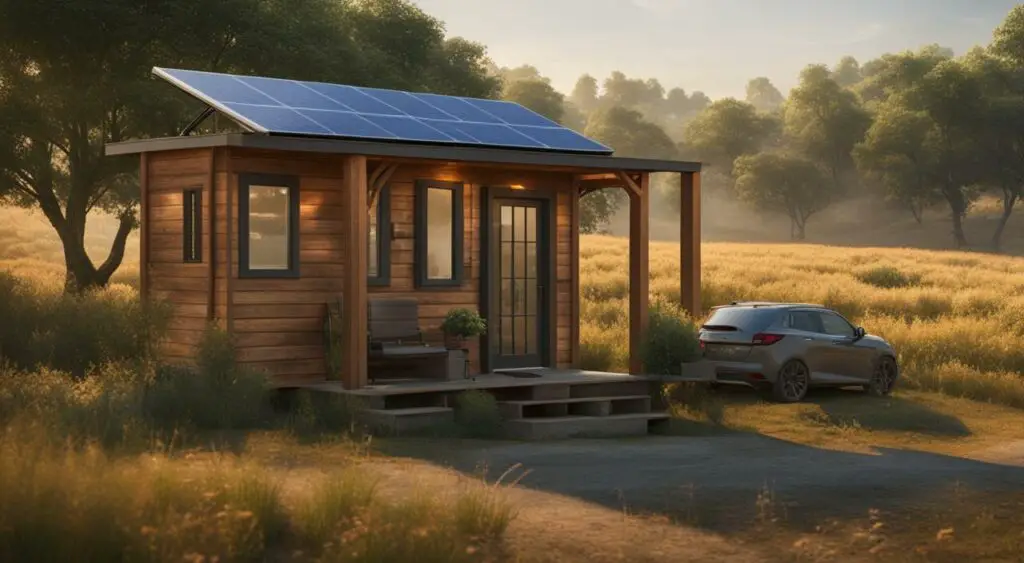
Living in a tiny house on wheels means you have the flexibility to move your home whenever needed. However, parking and location laws vary depending on where you live.
In Virginia, there are specific regulations to follow when it comes to parking and locating a tiny house.
Tiny House Parking Laws in Virginia
One of the most critical things to keep in mind is the parking laws for tiny houses on wheels in Virginia. According to state law, tiny houses on wheels are classified as recreational vehicles.
As such, they are subject to the same parking regulations as RVs. When parked legally on private property, you don’t need a permit, but you have to follow setback requirements.
Tiny houses must be no closer than 5 feet from side and rear lot lines. They must also be no closer than 10 feet from the front lot line or roadway edge.
In addition, they must not block access to other buildings or impede the use of nearby roads or driveways.
If you plan to park your tiny house on wheels on public land, you need to check with the local authorities to see if it’s allowed and what permits are required.
Some cities and counties have specific zoning laws regarding the parking of RVs and tiny houses.
Virginia Zoning Laws for Tiny Homes
Each county and city in Virginia has its own set of zoning and building codes, which may affect where you can locate and park your tiny house.
Zoning laws dictate the types of structures allowed in each area and can impact how tiny houses are classified and regulated.
Before parking or locating your tiny home, you must check the local zoning laws and regulations to ensure that you’re following the rules.
Some areas may allow tiny homes in residential neighborhoods, while others may require them to be in designated areas or communities.
In rural areas, you may have more flexibility in terms of where you can park your tiny house, but you still need to follow the regulatory requirements set by local authorities.
Tiny House On Wheels Laws in Virginia
In Virginia, tiny houses on wheels are considered recreational vehicles and must meet certain requirements to be legally parked and utilized as a residence.
According to state law, a tiny house on wheels must be self-contained, meaning it must have its own water, sewage, and electricity systems.
It must also have been built to RV standards, including compliance with safety codes and standards set by the National Fire Protection Association (NFPA).
If you plan to build a tiny house on wheels in Virginia, you must comply with the construction codes and regulations set by the state and local authorities.
You will likely need to obtain permits and have your tiny house inspected to ensure that it meets safety and building standards.
Overall, it’s important to be familiar with the parking and location laws for tiny houses in Virginia to avoid any legal issues.
Make sure to do your research and follow the regulations set by local authorities when parking and locating your tiny home to ensure a hassle-free living experience.
Permits and Construction Process

Constructing a tiny house in Virginia requires obtaining various permits and meeting specific requirements.
The permitting process involves several steps, including determining the appropriate zoning and building codes for the location of the tiny house and submitting plans for review.
Individuals seeking to build a tiny home in Virginia should start by researching the local zoning laws and building codes to identify the regulations that apply to their specific location.
They can consult with the local building department to determine the requirements and fees for obtaining the necessary permits.
Permits needed for tiny houses in Virginia include building permits, electrical permits, plumbing permits, and gas permits, depending on the specifics of the construction project.
After obtaining the necessary permits, individuals can begin the construction process, ensuring that they comply with all relevant regulations and building standards.
Sample Permitting and Construction Timeline
A typical timeline for the permitting and construction process of a tiny house in Virginia is four to six months, depending on the complexity of the project. Below is a sample timeline:
| Step | Duration |
|---|---|
| Determine Zoning and Building Codes | 1 week |
| Submit Plans for Review | 2-4 weeks |
| Obtain Permits | 2-4 weeks |
| Site Preparation and Foundation | 1-2 weeks |
| Frame Construction | 2-3 weeks |
| Roofing, Electrical, Plumbing, and HVAC | 2-4 weeks |
| Interior and Exterior Finishing | 2-3 weeks |
| Inspections | 1-2 weeks |
It is crucial to note that the timeline may vary depending on the complexity and size of the tiny house project and the availability of resources, including labor and materials.
Therefore, it is advisable to plan for potential delays and have alternative strategies in place.
Applicants should also be aware that permits and inspections may require additional fees, which can increase the overall project cost.
However, obtaining the necessary permits and complying with relevant regulations can help ensure the safety and legality of the tiny house project.
Virginia’s Small House Regulations
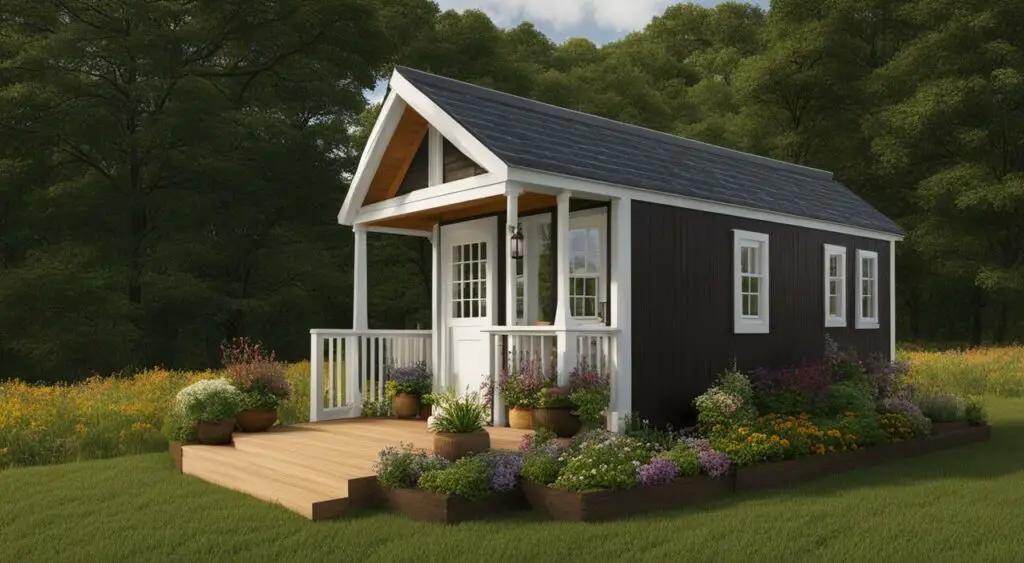
These regulations, found in the Virginia Residential Code (VRC), specify that single-family dwellings must have at least one room with at least 120 square feet and all other habitable rooms must be at least 70 square feet.
Additionally, the ceiling height in each room must be at least 7 feet.
For small houses, the VRC allows for a minimum habitable room size of 220 square feet and a ceiling height of at least 7 feet. This could potentially apply to some tiny homes, depending on their size and design.
It’s important to note that while these regulations may provide some flexibility for small and tiny homes, they do not exempt them from other building and zoning requirements.
As such, it’s crucial to consult with local authorities and obtain the necessary permits and approvals before beginning any construction project.

Conclusion
Living in a tiny house in Virginia can be a uniquely rewarding experience, but it’s important to understand and comply with the state’s regulations and requirements.
From the Virginia Residential Code to zoning laws, building codes, and permits, there are a variety of legal guidelines and restrictions that tiny house owners must navigate.
Fortunately, with the growing popularity of tiny houses, there are also advocacy groups and communities that are working to shape these regulations and promote tiny house living in Virginia.
By staying informed and involved, you can help contribute to the Tiny House Movement in the state.
In conclusion, whether you’re interested in building a tiny house or simply curious about tiny house regulations, this quick guide provides a comprehensive overview of the legal framework surrounding tiny houses in Virginia.
By following these guidelines and understanding the nuances of tiny house living in Virginia, you can enjoy the benefits of minimalism, sustainability, and community that this lifestyle can provide.
Other related articles
- Tiny House Laws Indiana: Unlocking the Secrets
- Tiny House Laws in Massachusetts: The Ins and Outs
- Tiny House Laws Colorado: A Friendly Guide
- Tiny House Laws in Florida: Everything You Need to Know
- Understanding Tiny House Laws in Virginia: A Quick Guide
- Tiny House Laws Wisconsin: Understanding The Law

Arc. Joseph Benson the CEO of Free tiny homes, Free Tiny Homes is a free, open-source, collaborative resource for anyone interested in building their own tiny home…


